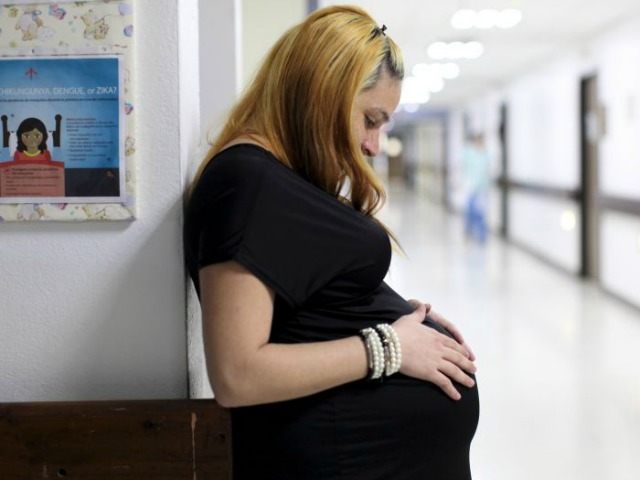Doctors in Brazil say they are shocked by what they perceive as a surge in the number of women raising children with microcephaly alone, after their male partners leave them, blaming the woman for their child’s disorder. The number of microcephaly cases in Brazil has increased significantly since the current outbreak of the Zika virus began.
“I am surprised by the number of women who are taking care of their baby alone because the father simply decided to abandon the family,” one pediatrician, who refused to identify herself, told Brazil’s Estado de Sao Paulo. Spain’s El Mundo notes that, “while there are no official statistics regarding this, there are many men abandoning pregnant women in Brazil when they learn that their child will be born with microcephaly.”
Microcephaly is a disorder in which an infant is born with a skull too small for his or her brain, severely damaging the brain. Brazilian doctors are struggling to understand how a pregnant woman contracting the Zika virus may lead to this deformity in their infant.
Adults who contract Zika typically experience mild symptoms of infection, such as conjunctivitis and fever. Eighty percent of patients experience no symptoms at all. A small amount develop a rare nerve disorder, however: Guillain-Barré syndrome, which causes severe muscle pain, paralysis, and death.
Angela Rocha, a pediatric infectologist at the Oswaldo Cruz institute in Brazil, tells the Estado that, anecdotally, the cases where she has seen men abandon their children have been those in which the relationship was frayed prior to the Zika diagnosis. “Typically, men have great difficulty accepting their child’s illness,” she notes, but those who abandon are men “who had trouble assuming responsibility” even before knowing of the disease.
Carla Silva tells the Estado her husband of nine years left her after her daughter, their third child, was born with microcephaly. “He blamed me for her birth. … He said the girl was sick because I was a bad person,” she says. Silva is raising the three children alone now, victim of what El Mundo notes many have begun calling “male abortion”: when a man does not want his child, he can simply disappear. Silva’s husband does not answer phone calls and has blocked her and her family on various messaging applications.
Brazilians had already begun to use the phrase “male abortion” regarding the widespread practice of abandoning pregnant women should men feel they were unprepared to assume parenting responsibilities. In February 2015, Brazil’s National Council of Justice released a report asserting that at least 5.5 million Brazilian children were being raised without a father. “In Sao Paulo, nearly 700 million children do not have the father’s name in the certificate. It is absurd,” Alvaro Villaça Azevedo, a professor of civil law at the University of Sao Paulo, said at the time.
While microcephaly cases may be exacerbating an already prevalent trend, scientists assert they do not yet understand the link between microcephaly and Zika. Brazil has documented more than 4,000 cases of microcephaly suspected of being tied to Zika in the past year. In neighboring Colombia, however, 3,100 pregnant women have been confirmed to carry the virus, but the nation has yet to see a case of microcephaly. Similarly, El Salvador documented 13 healthy births this month by women carrying the Zika virus.
Despite the unconfirmed link between the virus and microcephaly, Brazil has recorded a noted increase in the number of illegal abortions in the country. (Abortion is only legal in Brazil if a judge deems it so, for reasons of rape, incest, or threat to the life of the mother.) In many of these cases, expectant mothers may not know whether they are carrying Zika or if their child is at risk for microcephaly but choose not to take the risk. The rise in these abortion cases coincides with a push by the international left, including American advocacy group Planned Parenthood, encouraging Latin American women to abort their children.
In cases where a child is born with microcephaly, doctors say there is a possibility of a “long, healthy, and – why not? – happy” life. “It is possible and necessary to have hope. … In the screening, parents are hopeless, no one gives them anything [to be hopeful about]. But, over time, there can be amazing advances,” one doctor who treats microcephaly patients tells the Estado de Sao Paulo, with the paper noting that experts deem it “impossible, and even irresponsible, to predict how children with microcephaly will develop, especially in cases derived from the Zika virus.”
Ana Carolina Caceres, a Brazilian journalist who has struggled with microcephaly her entire life, said she “felt attacked and offended” by the efforts made to encourage women to abort people like her. “I took it personally,” she added, noting that she wants to be an example to parents who hope to see their children grow up to live full lives.
“My girls wouldn’t choose to have microcephaly, but I want to reassure parents their children will be so much stronger than they think,” said Gwen Hartley, the mother of two daughters with microcephaly. She chose to keep her daughters, despite being told they would not live past age one. They are now 14 and nine years old. “But they’re like any other girls,” she added. “They like rap music and watch TV, and they have their own personalities.”

COMMENTS
Please let us know if you're having issues with commenting.